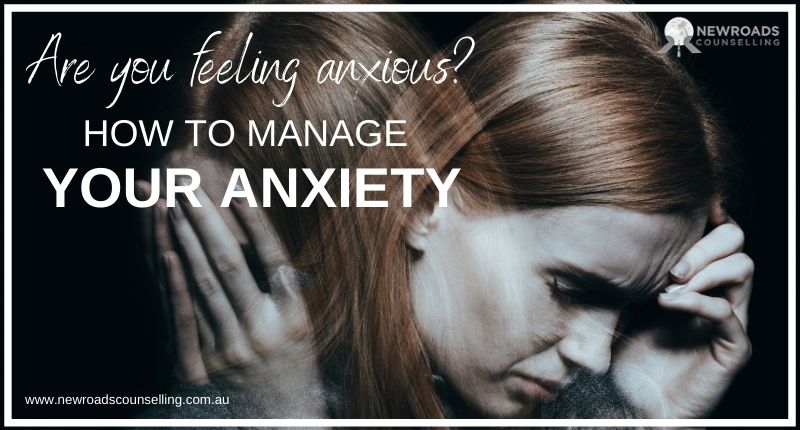Anxiety is an emotion characterised by nervousness, excessive worry and is often driven by fear. It is an unpleasant experience and can vary from mild to severe. One of the common causes include people bringing their unknown future to the present time, as if it is happening right now.
Everyone has some experience of being anxious in their lifetime. It is normal to feel anxious at times, e.g. feeling anxious before going for an operation, when public speaking, or before giving birth, etc.
However, if you always feel anxious without any particular reason or are excessively anxious, then it is most likely that you experience an anxiety disorder, which is a type of mental illness. There are different types of anxiety, including panic attack and phobias. Many people who suffer from anxiety disorders may experience depression at the same time. It is understandable that sometimes having a label like “anxiety disorder” or other types of mental illness can be quite daunting, and some are fearful of the stigma and are scared they will be treated differently by their family and friends.
Remember, there is nothing to be embarrassed about if you have an anxiety disorder, and it is treatable.
WHAT HAPPENS TO PEOPLE WHO ARE ANXIOUS
Everyone is different, and therefore have different emotional and thought processes that make them anxious, such as:
- They rely on outside factors for their happiness, instead of coming from within themselves.
- Their motto is “what if….” and this can lead to panic attacks and phobias, e.g. “what if no one likes my presentation”, “what if I cannot answer all the questions in the interview”, “what if no one will talk to me at the party”, etc.
- They see themselves through other people’s “glasses” in a negative way and believe in it, even though it is not proven, e.g. “everyone thinks I am not good”, “everyone will laugh at me”, “no one will like me”, “people think there is something wrong with me”, etc.
- They like to compare themselves with others, impacting their low self-esteem, e.g. “I am not as clever as him”, “I am not attractive like her”, etc.
- They catastrophise things, letting small problems grow into massive disasters in their mind, e.g. “He didn’t call me, maybe he is interested in another girl.”
- They focus on the failings, shortcomings, and weaknesses of themselves, rather than their strengths and successes.
- They are often waiting to be rescued rather than overcoming their issues themselves, sometimes blaming others when feeling let down.
- They start looking for and anticipating that something will go wrong again when things go right and smoothly.
- And many more…
Untreated anxiety can take over and paralyse their life from moving forward, which gives a sense of powerless and hopelessness.
WHAT TO DO WHEN YOU EXPERIENCE ANXIETY
There are some practical steps that you can do, but of course, it will require you to put in practice to get the result:
1. Acceptance
Accept that you are suffering from anxiety. Anxiety is part of your life. Denying it will make it your own worst enemy, as it will catch you sooner or later. Accepting it will help you to be able to deal with it, either by yourself or professionally.
2. Mindfulness
Being aware of your own pace, e.g. noticing your breathing, taking deep breaths in and out slowly. This exercise will help you to distract your anxiety at present and avoid hyperventilation. Counting is another way to regulate your breathing. There are other mindfulness techniques that you can adapt, and often therapists can help you with this.
3. Allocate a worrying time
Allocate a worrying time will help you to train your brain by setting a time each day, say 30 minutes, where you can attend to all that you are anxious about and jot down what they are. For instance: “everyone thinks I am not good”, and then ask yourself: “really?” Then try to list two or three things that you are good at and see how you actually are good at something. Another example might be, “others might see me over-dressed”, ask yourself: “who are these others?”, has someone actually commented to you? If no one has commented on that, then your brain has tried to trick you.
4. Truth versus trick
Asking yourself whether your thinking is based on facts – if not, then it must be a trick. Remember, often your brain goes faster than it should. Therefore, it is helpful if you write down a list of your thoughts and beliefs on a piece of paper on one side, and write down the facts of each of each thought and belief on the other side.
5. Stay in the present time
Stay in the present time will break the cycle of bringing the unknown future to the now, you need to live in the current time and remind yourself of it because what you are anxious about has not happened yet. Staying in the present will save your emotional and mental energy.
6. Facing it
You need to face and overcome your anxiety by taking small steps against what you are anxious or fearful about, because the more you do it, the more you will gain more confidence. And the more you gain confidence, the less your anxiety becomes. There are times that you may need to take some medication to help you cope better, just like someone who has to take diabetic tablets to control their sugar level. Remember, there is no shame about it.
If you cannot handle your thoughts and emotions yourself, then perhaps it’s time for you to seek professional help, to be assessed or diagnosed correctly. Your courage to seek professional help will enable you to have a better quality of life rather than living under anxiety’s power.

